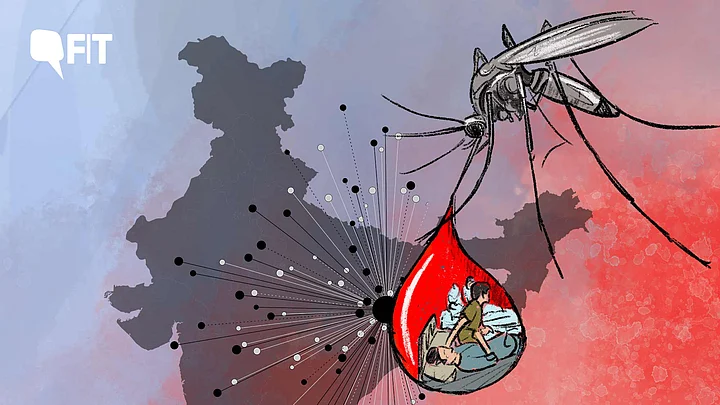Singapore's dengue caseload crossed the 13,000 mark early June 2022, crossing the total cases through the whole dengue season in 2020 and 2021.
Singapore's dengue season usually lasts from June to August, but the country's National Environment Agency has warned of an outbreak.
Should India similarly be concerned about a dengue outbreak here? FIT spoke to Dr. JP Muliyil, Epidemiologist and Chairman of the Scientific Advisory Committee to the National Institute of Epidemiology and profesor.
Here's everything you need to know about India's dengue season in 2022.
Will India Experience A Dengue Outbreak?
"If you look at the word 'epidemic', the definitions are rather vague and loose. Dengue is endemic in India. Not only in India, it's endemic in many other countries like Malaysia, Pakistan, and Vietnam," says Dr Muliyil.
Dengue outbreaks are common in India, with India reporting over 1.64 lakh dengue cases in 2021 and 2.05 lakh cases in 2019, according to a statement from the Health Ministry in the Rajya Sabha.
Keep in mind that these are simply the cases that were reported and recorded as dengue infections.
Dengue is so severely underreported worldwide, that in 2010, the WHO had recorded 2.2 million cases of dengue worldwide, but estimation models put the real number closer to 96 million.
"In parts like Malaysia and other parts of the far east the dengue was more of a haemorrhagic disease and in India it's more a mild illness. In certain forms, dengue can cause death. But if you ask, say how many people in Tamil Nadu have dengue, I'd say probably more than half."Dr Muliyil, Epidemiologist
"But it's a little more complicated than that, because there are four different types of dengue virus."
Dengue has four virus serotypes that we know of - DENV-1, DENV-2, DENV-3, and DENV-4.
Dengue: What Are The Different Types and Symptoms?
A 2015 study closely examined patients with all four types of dengue and came to the following conclusion:
"DENV-1 infections may be more severe compared with DENV-2 infection. DENV-1 cases were more likely to present with red eyes whereas the absence of red eyes but presence of joint pain and lower platelet count was associated with DENV-2 cases."
The different dengue serotypes found in India and Singapore are predominantly DENV-1, DENV-2, and DENV-3, with very few cases of DENV-4.
The study adds that differences in severity may be caused by variations in plasma viral RNA levels between the serotypes.
Dr. Muliyil adds, "When you have the first infection, you don't have any antibodies so you'll recover mostly and you'll feel fine. But in some cases of reinfection with another type of dengue in a year or two, the body tends to, in some cases, not all, react violently. It's a case of our immune system overreacting."
"This can be dangerous."
Severe dengue can lead to dengue hemorrhagic fever (DHF), which can potentially be fatal.
According to the US Centers for Disease Control (CDC) this starts with signs of severe disease, 3 to 7 days after the initial symptoms start. The symptoms include intense abdominal pain, changes in temperature from hypothermia to fever, confusion, irritability, and even signs of shock.
This can quickly turn fatal if treatment isn't administered by a medical professional.
What Can We Do To Protect Ourselves?
Dengue is transmitted to humans from mosquito bites. More specifically, the bite of the female Aedes aegypti is the primary means of transmission. Fortunately, Dr. Muliyil says that the Aedes aegypti needs clean water to grow and multiply, and that it doesn't travel far from its place of origin.
"Cups with clean water, buckets, small puddles in construction sites, these are all potential breeding grounds for this mosquito, which is also called the Tiger Mosquito. It also doesn't travel more than 100 metres from its breeding ground, which means it becomes easy to limit their spread, through the proper care."Dr. JP Muliyil
The WHO recommends a list of steps to protect yourself and your community from dengue. These include:
Prevention of mosquito breeding by eliminating access to breeding habitats like domestic water storage or open containers with clean water.
Covering, emptying and cleaning water storage containers on a weekly basis.
Personal protection including using mosquito repellant, mosquito coil, electric bats, and other measures.
Wearing clothes that reduce skin exposure.
Educating the community about prevention and safety measures.

